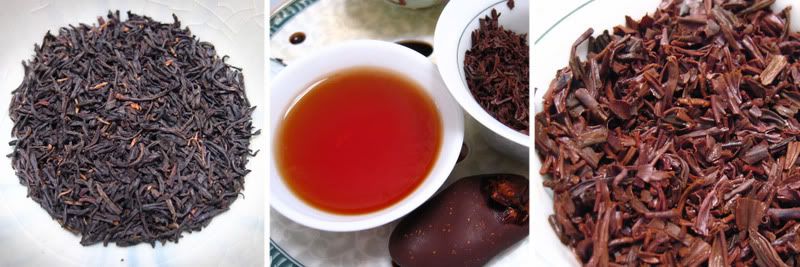
The sample being tasted here is a "top grade" Qimen Hong (Red Keemun) from Anhui Province (available from Jing Tea Shop). It has all the classic red tea characteristics. Dry leaves appear small, rolled, and in broken pieces, a common appearance of Qimen Hong. I placed 1/5 full of dry leaves into my gaiwan, which when brewed the steeped leaves filled 1/2 of the gaiwan.
Off-boiling spring water was used; flash rinse once, followed by 10s, 5s, 5s, 5s, 5s, 10s...
The liquor has an earthy-red color with an orange "bao guang" (halo). I botched the 1st brew by steeping the tea for too long (10 secs). Although the nose was inviting, the tea was bitter. For the 2nd brew, I reduced the time by ~5 secs, and the tea came out much better with distinct aromas of flowers, sweet fruits and salty plums. The smell and color of the wet leaves reminded me somewhat of Oriental Beauty oolong. Subsequent few infusions saw the tea improved in taste and aroma, but the mouthfeel became more tannic. Fine dusty tannin coated the entire mouth. I can see how a touch of milk would tame the tannins.
The finish was quite deceptive, which is a classic red tea behaviour. Though it seemed as if the finish was short, it actually lingered for a while after I drank the last cup. The one thing that bothered me about this tea was the harsh after effect on my throat...I felt as if I had a mild sore throat.
The liquor has an earthy-red color with an orange "bao guang" (halo). I botched the 1st brew by steeping the tea for too long (10 secs). Although the nose was inviting, the tea was bitter. For the 2nd brew, I reduced the time by ~5 secs, and the tea came out much better with distinct aromas of flowers, sweet fruits and salty plums. The smell and color of the wet leaves reminded me somewhat of Oriental Beauty oolong. Subsequent few infusions saw the tea improved in taste and aroma, but the mouthfeel became more tannic. Fine dusty tannin coated the entire mouth. I can see how a touch of milk would tame the tannins.
The finish was quite deceptive, which is a classic red tea behaviour. Though it seemed as if the finish was short, it actually lingered for a while after I drank the last cup. The one thing that bothered me about this tea was the harsh after effect on my throat...I felt as if I had a mild sore throat.
A good quality Qimen Hong, though not to my personal taste.
7 comments:
i'm so glad you are posting on using gongfu technique on hongcha. i think people tend to think that if it's hong, it has to be brewed 'english style,' which of course is not true. and your very clear narrative of this experiment shows what a massive difference even a few seconds can make.
i hope you'll do more of these, with various other hongcha -- and tell us about each one!
Thanks, Corax. Will definitely do more hongcha. I have some black, green and white to play with at the moment.
Qi Men is the only red tea that I've really spent time drinking, I was so taken with it at the time I devoted a 120ml yixing to it. I've only had four different lots over the past 18 months and I have to say I was dissapointed in the (25g sample) pack from jings.
I may have been expecting too much but even after a side to side comparison with the qi men from kam at funallinace it did not fare well.
On It's own I was using around 6-7g in quite a small pot and the first few infusions were less than 5s. The tea looked and smelt good although there seemed to be something missing from it, the aftertaste was astringent and it seemed to lack the almost malty taste I would associate with good scotch whisky and appreciated from the first few times I've had Qi men.
Having said that, it is the only time I've been dissapointed in a jingteashop purchase.
Thanks for your input, Anonymous. I wouldn't rave too much about the Qimen that I tasted for this post, either. It's quite good, don't get me wrong. Perhaps it was my brewing method, but I've tasted smoother, maltier and more chocolatey Qimen Hong before without that harsh throat after effect.
I wanted to get some Qimen Hong from Kam, but it was quickly sold out before I knew he had gotten some during his tea trip. Can you suggest to me where I could get a really good Qimen Hong, Anonymous? Thanks!
I should really get myself some hongcha and compare with my lapsang...
My experience in this regard (brewing them properly) is sorely lacking
Sorry Phyll, I've not tried any good batches availible online. If I find any I'll let you know.
MarshalN: Not sure if you've had it, but I really enjoy Yunnan (pure) Gold. Very mellow and smooth.
Post a Comment